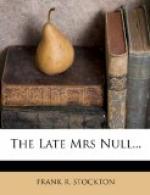Lawrence shut down the window, and hopped back to the fire. “There is my last chance gone,” said he to himself. “I suppose I may as well take old Mrs Keswick’s advice, and wait for fair weather. But, even then, who can say what sort of sky Roberta March will show?” And, not being able to answer this question, he put two fresh sticks on the fire, and then sedately sat and watched their gradual annihilation. As for Miss Annie, she took her walk, and stepped along the road as lightly and blithely as if the skies had been blue, and the sun shining; and almost before she knew it, she had reached the store at Howlett’s. Ascending the high steps to the porch, quite deserted on this damp, unpleasant morning, she entered the store, the proprietor of which immediately jumped up from the mackerel kit at the extreme end of the room, where he had been sitting in converse with some of his neighbors, and hurried behind the counter.
“Have you any tea,” said Miss Annie, “better than the kind which you usually sell to Mrs Keswick?”
“No, ma’am,” said he. “We send her the very best tea we have.”
“I am not finding fault with it,” she said, “but I thought you might have some extra kind, more expensive than people usually buy for common use.”
“No, ma’am,” said he, “there is fancy teas of that kind, but you’d have to send to Philadelphia or New York for them.”
“How long would that take?” she asked.
“I reckon it would be four or five days before you’d get it, ma’am,” said the storekeeper.
“I am afraid,” said Miss Annie, looking reflectively along the counter, “that that would be too long.” And then she turned to go, but suddenly stopped. “Have you any guava jelly?” she asked.
The man smiled. “We don’t have no call for anything as fancy as that, ma’am,” he said. “Is there anything else?”
“Not to-day,” answered Miss Annie, after throwing a despairing glance upon the rolls of calicoes, the coils of clothes-lines, the battered tin boxes of tea and sugar, the dusty and chimneyless kerosene lamps, and the long rows of canned goods with their gaudy labels; and then she departed.
When she had gone, the storekeeper returned to his seat on the mackerel kit, and was accosted by a pensive neighbor in high boots who sat upon the upturned end of a case of brogans. “You didn’t make no sale that time, Peckett,” said he.
“No,” said the storekeeper, “her idees is a little too fancy for our stock of goods.”
“Whar’s her husband, anyway?” asked a stout, elderly man in linen trousers and faded alpaca coat, who was seated on two boxes of pearl starch, one on top of the other. “I’ve heard that he was a member of the legislatur’. Is that so?”
“He’s not that, you can take my word for it,” said Tom Peckett. “Old Miss Keswick give me to understand that he was in the fertilizing business.”
“That ought to be a good thing for the old lady,” said the man on the starch boxes. “She’ll git a discount off her gwarner.”




